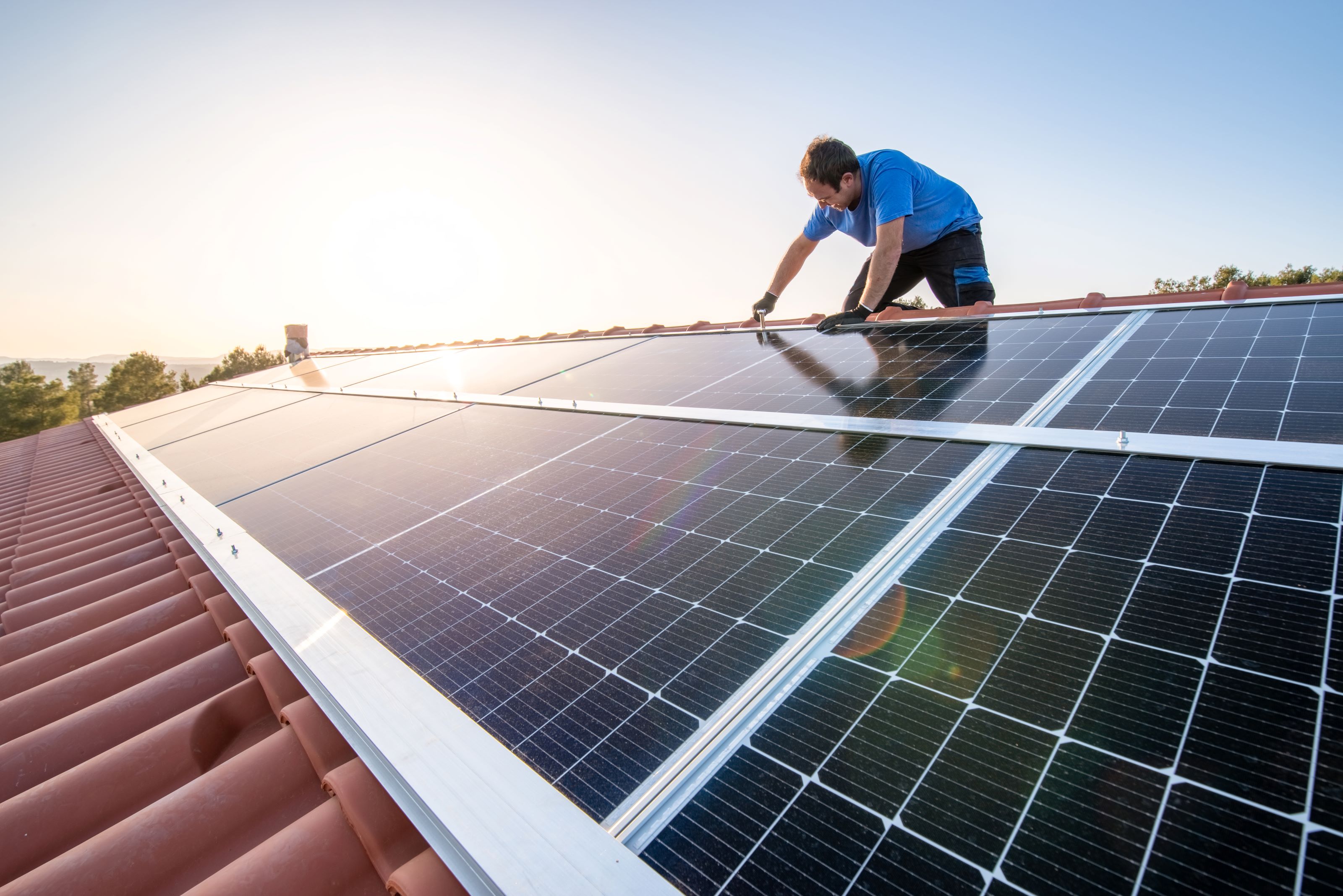2 Tax Credits to Claim for Energy-Efficient Home Renovations
These tax incentives reward energy-efficient home improvements in different ways. Which credit you use depends on the remodeling you do.


Profit and prosper with the best of Kiplinger's advice on investing, taxes, retirement, personal finance and much more. Delivered daily. Enter your email in the box and click Sign Me Up.
You are now subscribed
Your newsletter sign-up was successful
Want to add more newsletters?

Delivered daily
Kiplinger Today
Profit and prosper with the best of Kiplinger's advice on investing, taxes, retirement, personal finance and much more delivered daily. Smart money moves start here.

Sent five days a week
Kiplinger A Step Ahead
Get practical help to make better financial decisions in your everyday life, from spending to savings on top deals.

Delivered daily
Kiplinger Closing Bell
Get today's biggest financial and investing headlines delivered to your inbox every day the U.S. stock market is open.

Sent twice a week
Kiplinger Adviser Intel
Financial pros across the country share best practices and fresh tactics to preserve and grow your wealth.

Delivered weekly
Kiplinger Tax Tips
Trim your federal and state tax bills with practical tax-planning and tax-cutting strategies.

Sent twice a week
Kiplinger Retirement Tips
Your twice-a-week guide to planning and enjoying a financially secure and richly rewarding retirement

Sent bimonthly.
Kiplinger Adviser Angle
Insights for advisers, wealth managers and other financial professionals.

Sent twice a week
Kiplinger Investing Weekly
Your twice-a-week roundup of promising stocks, funds, companies and industries you should consider, ones you should avoid, and why.

Sent weekly for six weeks
Kiplinger Invest for Retirement
Your step-by-step six-part series on how to invest for retirement, from devising a successful strategy to exactly which investments to choose.
Two federal income tax credits reward energy-efficient home improvements very differently. Which credit you use depends on the improvements you make. Under federal tax law, new energy-efficient windows and doors don't count for much, but a system that uses renewable energy to power a home gets you a juicy tax break. The credits differ in other ways, with one imposing a cap and the other, for the most part, placing no such limit. Whether home improvements to a vacation home can qualify is another differentiator.
Neither of these tax credits is refundable; they can only be used to reduce the amount of income tax owed. If the credit exceeds your tax liability, the IRS won't refund you the difference. Eligible homeowners claim the credits on IRS Form 5695. Although the clock is ticking for the use of both home improvement credits, it may be less of a problem than you think.

The Residential Energy Efficiency Property Credit
If you installed an alternative energy system in your home that relies on a renewable source, this credit is for you. Renewable energy sources include solar, wind, geothermal or fuel cell technology to generate power. Solar panels, solar electric equipment, solar-powered water heaters and wind turbines are all eligible for the credit, whether they are installed in a primary residence or vacation home. A residential fuel cell, however, must be installed in your primary home to qualify.
The size of the tax credit varies and equals 26% of the cost of equipment and installation for renewable energy systems that were put in between 2020 and 2022. The credit falls to 23% in 2023 before expiring in 2024. Pre-2020 installations qualified for a 30% tax credit. There is no maximum dollar limit for solar, wind or geothermal equipment, but the tax credit for fuel cells is capped at $500 for each half-kilowatt of power capacity. Any unused portion of the credit can be carried over to future tax years.
Keep in mind you can only qualify for the credit once the alternative energy system has been installed. If you buy solar panels at the end of 2021 but don't install them until early 2022, you cannot claim the 26% tax credit on your 2021 return. Instead, you must wait and claim it when you file your 2022 taxes.
Homeowners who install a renewable energy system sometimes qualify for a rebate from their utility company, which will affect the tax credit amount. Although these rebates are nontaxable, the cost of the system is reduced by the rebate amount when you calculate your tax credit. For example, if you install a $20,000 solar system this year and the utility gives you a one-time installation rebate of $1,000, your tax credit is $4,940 (26% x [$20,000 - $1,000]).

The Nonbusiness Energy Property Credit
Although less valuable, this credit works for homeowners who make smaller energy-saving purchases for a primary residence in 2021. The credit applies to 10% of the cost of certain types of insulation, external windows and doors, and skylights. The credit also includes 100% of the cost of electric heat pumps and water heaters, some central air-conditioning systems, stoves that use biomass fuels, or similar energy-saving investments.
This may sound like a generous tax break, but it's not. The total credit is worth at most $500, and amounts taken in prior years count against it. For instance, if you claimed a $300 credit on your 2014 return for a natural gas furnace, you are only entitled to $200 more until the credit expires in 2022. The credit is also capped for many items. No more than $150 can be claimed for water heaters and furnaces, $200 for windows and $50 for a furnace-circulating fan.
Don't worry about the expiration dates for these tax credits. Congress has extended both credits many times, including retroactively. Some lawmakers want to make both credits permanent and even expand them. One Senate bill calls for raising the residential energy efficiency property credit to 30% and the maximum nonbusiness energy property credit to $1,500 per year. Whether these proposals will be enacted is unclear, but Democrats are pushing for them.
Profit and prosper with the best of Kiplinger's advice on investing, taxes, retirement, personal finance and much more. Delivered daily. Enter your email in the box and click Sign Me Up.

Joy is an experienced CPA and tax attorney with an L.L.M. in Taxation from New York University School of Law. After many years working for big law and accounting firms, Joy saw the light and now puts her education, legal experience and in-depth knowledge of federal tax law to use writing for Kiplinger. She writes and edits The Kiplinger Tax Letter and contributes federal tax and retirement stories to kiplinger.com and Kiplinger’s Retirement Report. Her articles have been picked up by the Washington Post and other media outlets. Joy has also appeared as a tax expert in newspapers, on television and on radio discussing federal tax developments.
-
 5 Vince Lombardi Quotes Retirees Should Live By
5 Vince Lombardi Quotes Retirees Should Live ByThe iconic football coach's philosophy can help retirees win at the game of life.
-
 The $200,000 Olympic 'Pension' is a Retirement Game-Changer for Team USA
The $200,000 Olympic 'Pension' is a Retirement Game-Changer for Team USAThe donation by financier Ross Stevens is meant to be a "retirement program" for Team USA Olympic and Paralympic athletes.
-
 10 Cheapest Places to Live in Colorado
10 Cheapest Places to Live in ColoradoProperty Tax Looking for a cozy cabin near the slopes? These Colorado counties combine reasonable house prices with the state's lowest property tax bills.
-
 10 Cheapest Places to Live in Colorado
10 Cheapest Places to Live in ColoradoProperty Tax Looking for a cozy cabin near the slopes? These Colorado counties combine reasonable house prices with the state's lowest property tax bills.
-
 New Gambling Tax Rule Means More Tax on Super Bowl 2026 Bets
New Gambling Tax Rule Means More Tax on Super Bowl 2026 BetsTaxable Income When Super Bowl LX hype fades, some fans may be surprised to learn that sports betting tax rules have shifted.
-
 Should You Do Your Own Taxes This Year or Hire a Pro?
Should You Do Your Own Taxes This Year or Hire a Pro?Taxes Doing your own taxes isn’t easy, and hiring a tax pro isn’t cheap. Here’s a guide to help you figure out whether to tackle the job on your own or hire a professional.
-
 Can I Deduct My Pet On My Taxes?
Can I Deduct My Pet On My Taxes?Tax Deductions Your cat isn't a dependent, but your guard dog might be a business expense. Here are the IRS rules for pet-related tax deductions in 2026.
-
 Don't Overpay the IRS: 6 Tax Mistakes That Could Be Raising Your Bill
Don't Overpay the IRS: 6 Tax Mistakes That Could Be Raising Your BillTax Tips Is your income tax bill bigger than expected? Here's how you should prepare for next year.
-
 Oregon Tax Kicker in 2026: What's Your Refund?
Oregon Tax Kicker in 2026: What's Your Refund?State Tax The Oregon kicker for 2025 state income taxes is coming. Here's how to calculate your credit and the eligibility rules.
-
 Will IRS Budget Cuts Disrupt Tax Season? What You Need to Know
Will IRS Budget Cuts Disrupt Tax Season? What You Need to KnowTaxes The 2026 tax season could be an unprecedented one for the IRS. Here’s how you can be proactive to keep up with the status of your return.
-
 3 Retirement Changes to Watch in 2026: Tax Edition
3 Retirement Changes to Watch in 2026: Tax EditionRetirement Taxes Between the Social Security "senior bonus" phaseout and changes to Roth tax rules, your 2026 retirement plan may need an update. Here's what to know.
